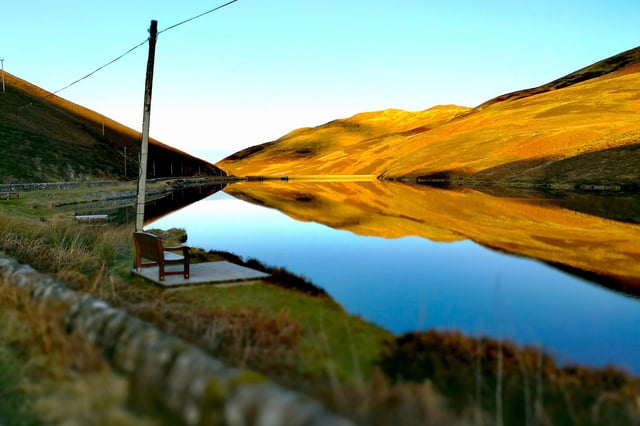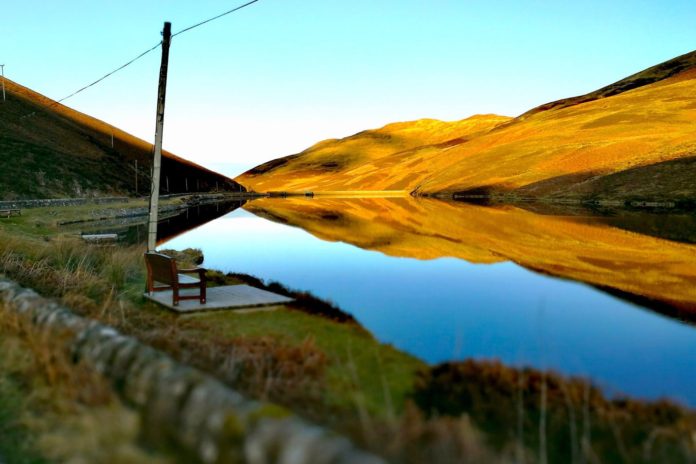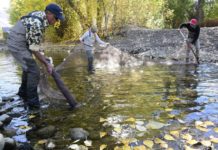
She expects a surge in interest as anglers have been desperate to have a cast during lockdown but Karen asks that fishermen respect Scottish Government travel guidelines.
Tiger trout into double-figures are among the current fish population in the reservoir high in the Pentland Hills above Flotterstone, around three miles from Penicuik.
Built in 1851, the 25-acre reservoir holds 117 million gallons and has been closed since October.
Four boats are available, however, Karen stressed that bank fishing is traditionally more successful at the start of the season.
Traffic light buzzer patterns and red diawl bach flies have proved the most successful in the opening weeks of previous seasons.
Karen believes they will again be prominent in fly boxes carried by her regulars to the water which has a maximum depth of 51ft and is 850ft above sea level.
She stressed the need to book ahead if you wish to fish and asked anglers to bring the correct money. No credit card payments can be accepted as there is no wi-fi connection at the fishery.
“The boats went in last weekend and we expect to be really busy as anglers have been itching to get out,” she said. “Please don’t turn up on spec.
“We have four boats in the water at the moment as bank fishing has always proved the most profitable at this time of year.
“The fishery offers unrivalled fly fishing and we are only 15 minutes from Edinburgh. The reservoir is stocked regularly with hard-fishing trout weighing up to 20lbs.”
The on-site cabin will not be open and permits will be issued through a window. Prices are £15 for four hours catch and release, £17 for six hours catch and release and £19 for eight hours on the same basis.
If anglers want to kill one fish during a four-hour session that is £17, a six-hour session killing two fish is £20, an eight-hour stay killing three fish is £24 and an eight-hour stint killing four fish is £28. There are concession prices for senior citizens.
The fishery will be open from 9am to 5pm this weekend and seven-days-a-week throughout March.
Allandale Tarn re-opened on Friday and owner Iona Allan said: “We will be open every day except Tuesdays. Our hours of fishing are 9am to 4.30pm.”
Elsewhere, Paul Dancer was the toast of newly re-opened Bowden Springs near Linlithgow with a 10lb brown trout in a fine bag of four and Simon Jones landed two around the 10lb mark. Popular patterns recently have been black and green lures, squirmy wormies, Ally McCoist and yellow dancer.
Rosslynlee near Penicuik have re-stocked and fish have been located at various depths from two to 16ft. Fish have been noted on the surface late in the day.
Buzzers, caddis and lures have proved the best with Chris Hunter and Kevin Walkinshaw both returning six and Rosslynlee regular Rab Amos four on buzzer and egg while Tam Preston also hooked four using orange nomad and pink buzzers.
Marc Anderson reports that very little is being caught at the moment on the Esk at Musselburgh with weather and water conditions limiting the number of days suitable for anglers.
Anderson, president of the Musselburgh and District Angling Association, said: “The snowmelt and subsequent run off from the roads drawing much salt into the river appears to have put the grayling off the feed. Fish have been getting caught on the few days where things were settled.”
Scot Muir, secretary of West Lothian Angling Association, reports that only a handful of anglers have been having a cast on the Almond. There are no reports from Cramond Angling Association who also have an eight-mile stretch on the river.
Finally, wild Atlantic salmon are in crisis as the numbers returning to spawning grounds has fallen dramatically.
Experts fear the species could be lost from many rivers in our lifetime if action is not taken now.
And concerned conservationists claim large salmon have declined by between 54 to 88 per cent whilst smaller salmon (grilse) have declined between 40 and 66 per cent.
The Atlantic Salmon Trust, the Game and Wildlife Conservation Trust, and the Angling Trust, have been joined by the Rivers Trust (RT) and Edinburgh-based Fisheries Management Scotland (FMS) in the Missing Salmon Alliance.
The organisation will collect evidence to lobby national and international decision-makers to regulate activities which impact on the fish.
Dr Alan Wells, CEO of FMS, admitted: “Our wild salmon are reaching crisis point and it is vital that we work in a co-ordinated manner across the UK to help wild salmon survive and thrive in our rivers and seas.
“Our members, working with a range of key stakeholders, are already delivering essential work to protect and enhance salmon in Scotland.
“Through the Missing Salmon Alliance, our collective capacity to address the pressures which wild salmon face will be significantly enhanced.”
And Mark Lloyd, CEO of the RT, stressed: “The decline in wild salmon populations should be of grave concern to everyone and it is a grim indicator of the impact that humans have had on the natural world.”
Credit: Source link






























